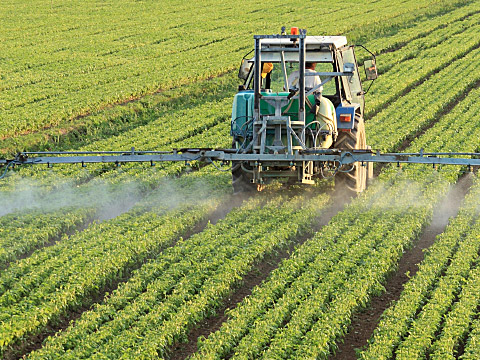More than $2.5 million in new funding supports livestock research in Michigan

EAST LANSING – The Michigan Alliance for Animal Agriculture will invest more than $2.5 million in 23 new research and outreach projects led by Michigan State University researchers and MSU Extension faculty.
Funding will be provided through the Michigan Department of Agriculture and Rural Development (MDARD) budget for fiscal year 2023–24.
The M-AAA began in 2014 and is a partnership between MDARD, Michigan livestock organizations and MSU to promote the livestock industry in Michigan.
“Livestock agriculture faces many short- and long-term challenges, including managing infectious diseases, improving animal welfare and strengthening environmental sustainability,” said James Averill, deputy director of MSU AgBioResearch and one of the leaders of M-AAA. “We appreciate the continued support of the Michigan Legislature and our M-AAA partners in our work to help Michigan producers.”
This year, research and outreach will cover a wide range of topics, including controlling diseases in dairy cows, improving dairy cow fertility, controlling tar spot and vomitoxin in silage maize, and developing tools to protect honey bee health.
“Investing in research to address important problems in livestock agriculture, such as the current outbreak of highly pathogenic avian influenza or the impact of regenerative agricultural practices, is critical to the long-term viability of livestock agriculture in Michigan,” said Tim Boring, MDARD director. “MDARD is proud to partner with the Michigan Alliance for Animal Agriculture to address these challenges for future generations of Michigan farmers.”
M-AAA projects last one or two years and are submitted in one of three categories: Applied Research, Extension, or Seed Funding. Project leaders must submit annual progress reports and final summaries to the M-AAA leaders.
Examples of projects in 2024:
- Adam Lock, a professor in the Department of Animal Sciences, will work to improve the use of high oleic soybeans in dairy cow diets. Lock’s previous M-AAA research has shown that a diet containing high oleic soybeans increases milk fat and protein yield without changing body weight, making them a very attractive feed with high-quality protein and fat to grow on Michigan farms. Previous research focused on mid-lactation cows, but the new project will examine the transition and early lactation phases to determine how high oleic soybeans can be most effectively used to achieve desired milk fat and protein gains while minimizing body weight loss during the early lactation phase.
- Richard Pursley, Professor in the Department of Animal Science, wants to increase the longevity of dairy herds by improving the fertility of multiparous cows – those in their second or higher lactation. Pursley found that more than 50% of cows leave the herd before their third lactation and that multiparous cows are more likely to miscarry. This project will examine the impact of highly fertile bulls on these cows. By reducing miscarriages and keeping multiparous cows in the herd, producers should achieve higher average milk production while saving on replacement costs and operating efficiency.
- Meghan Milbrath, assistant professor in the Department of Entomology, will develop means to protect honeybees from bacterial diseases. Honeybees are vital to Michigan agriculture, producing over 5 million pounds of honey each year and pollinating crops. Several common diseases threaten honeybees, particularly two bacterial diseases: American foulbrood and European foulbrood. The goals of the project include developing and sharing resources for beekeepers on bacterial diseases, developing a training protocol for dogs to detect hives infected with bacterial diseases, and educating beekeepers on how the dogs’ detection services can benefit their operations.
For a complete list of projects funded in 2024, visit canr.msu.edu/maaa/projects.

:max_bytes(150000):strip_icc():focal(824x192:826x194)/stevie-mackey-jennifer-lopez-070724-1-2d2b008c239a456883ba6a03a98f0908.jpg)

